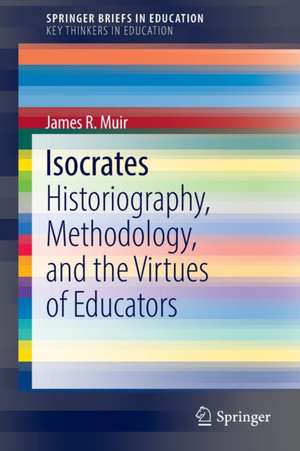Isocrates: Historiography, Methodology, and the Virtues of Educators: SpringerBriefs in Education
Autor James R. Muiren Limba Engleză Paperback – 3 iun 2022
This book argues careful study of the educational philosophy of Isocrates and its legacy can contribute to an improved understanding of the historiography of educational thought, his distinctive normative methodology in both political and educational philosophy, and his arguments about the primary importance of the virtues of self-knowledge and realistic self-appraisal for educational philosophers and practitioners.
At a time when educational philosophy has an increasingly precarious academic existence and educationists are actively seeking new historiographical and methodological approaches to the philosophical study of education, there is much to be gained by recovering and reevaluating the historiography and normative methodology of Isocrates and the role they play in educational discourse and practice today.
Din seria SpringerBriefs in Education
-
 Preț: 317.28 lei
Preț: 317.28 lei -
 Preț: 478.71 lei
Preț: 478.71 lei - 20%
 Preț: 387.44 lei
Preț: 387.44 lei - 17%
 Preț: 392.10 lei
Preț: 392.10 lei -
 Preț: 196.30 lei
Preț: 196.30 lei -
 Preț: 394.41 lei
Preț: 394.41 lei -
 Preț: 356.32 lei
Preț: 356.32 lei -
 Preț: 444.52 lei
Preț: 444.52 lei -
 Preț: 196.15 lei
Preț: 196.15 lei -
 Preț: 262.86 lei
Preț: 262.86 lei -
 Preț: 370.61 lei
Preț: 370.61 lei -
 Preț: 376.59 lei
Preț: 376.59 lei -
 Preț: 379.68 lei
Preț: 379.68 lei -
 Preț: 408.44 lei
Preț: 408.44 lei -
 Preț: 376.22 lei
Preț: 376.22 lei -
 Preț: 378.34 lei
Preț: 378.34 lei -
 Preț: 346.59 lei
Preț: 346.59 lei -
 Preț: 377.18 lei
Preț: 377.18 lei -
 Preț: 377.35 lei
Preț: 377.35 lei -
 Preț: 476.03 lei
Preț: 476.03 lei -
 Preț: 376.43 lei
Preț: 376.43 lei -
 Preț: 379.48 lei
Preț: 379.48 lei -
 Preț: 479.29 lei
Preț: 479.29 lei -
 Preț: 340.61 lei
Preț: 340.61 lei -
 Preț: 377.18 lei
Preț: 377.18 lei -
 Preț: 377.57 lei
Preț: 377.57 lei -
 Preț: 376.59 lei
Preț: 376.59 lei -
 Preț: 377.18 lei
Preț: 377.18 lei -
 Preț: 380.84 lei
Preț: 380.84 lei -
 Preț: 379.09 lei
Preț: 379.09 lei -
 Preț: 354.10 lei
Preț: 354.10 lei -
 Preț: 377.95 lei
Preț: 377.95 lei -
 Preț: 379.68 lei
Preț: 379.68 lei -
 Preț: 377.35 lei
Preț: 377.35 lei -
 Preț: 346.59 lei
Preț: 346.59 lei -
 Preț: 444.52 lei
Preț: 444.52 lei -
 Preț: 376.22 lei
Preț: 376.22 lei -
 Preț: 381.21 lei
Preț: 381.21 lei -
 Preț: 348.13 lei
Preț: 348.13 lei -
 Preț: 409.25 lei
Preț: 409.25 lei -
 Preț: 410.17 lei
Preț: 410.17 lei -
 Preț: 377.57 lei
Preț: 377.57 lei -
 Preț: 380.63 lei
Preț: 380.63 lei -
 Preț: 376.59 lei
Preț: 376.59 lei -
 Preț: 377.57 lei
Preț: 377.57 lei -
 Preț: 380.07 lei
Preț: 380.07 lei -
 Preț: 378.54 lei
Preț: 378.54 lei -
 Preț: 379.48 lei
Preț: 379.48 lei -
 Preț: 377.73 lei
Preț: 377.73 lei -
 Preț: 342.74 lei
Preț: 342.74 lei
Preț: 412.68 lei
Nou
Puncte Express: 619
Preț estimativ în valută:
78.97€ • 86.05$ • 66.54£
78.97€ • 86.05$ • 66.54£
Carte tipărită la comandă
Livrare economică 23 aprilie-07 mai
Preluare comenzi: 021 569.72.76
Specificații
ISBN-13: 9783031009709
ISBN-10: 3031009703
Pagini: 134
Ilustrații: X, 134 p. 4 illus.
Dimensiuni: 155 x 235 mm
Greutate: 0.21 kg
Ediția:1st ed. 2022
Editura: Springer International Publishing
Colecția Springer
Seriile SpringerBriefs in Education, SpringerBriefs on Key Thinkers in Education
Locul publicării:Cham, Switzerland
ISBN-10: 3031009703
Pagini: 134
Ilustrații: X, 134 p. 4 illus.
Dimensiuni: 155 x 235 mm
Greutate: 0.21 kg
Ediția:1st ed. 2022
Editura: Springer International Publishing
Colecția Springer
Seriile SpringerBriefs in Education, SpringerBriefs on Key Thinkers in Education
Locul publicării:Cham, Switzerland
Cuprins
Chapter 1. Isocrates and the History of Educational Ideas: Deficiencies of Educationist Historiography.- Chapter 2. First Philosophy in Educational Thought: The Four Questions and Two Methods.- Chapter 3. Against the Sophists: the First Virtues of the Educator and the Limits of Education.
Caracteristici
Demonstrates the influence of Isocrates in the history of educational philosophy and practice Explains Isocrates’ influence in contemporary educational theory and practice Is the first book directly concerned with the educational philosophy of Isocrates and its historical influence
